#Scholarship
Text

#autism#actually autistic#autism meme#When the Scholarship Panel ask about your past academic achievements.#People are telling me that it sound like I nailed it but I should just pretend I didn't get it so...#Thankfully it never occured to me that my first ever interview had panel mambers who are part of a governement body before I sat it#I feel like the text is still somewhat true but you only get good at something by actually doing it#academia#scholarship#lolita dress#When I Got The X Autism Instead Of Being Good At Math Or Science meme#Science#science meme#?#Also since this meme seems to be from the reddit folk#r/196#196
1K notes
·
View notes
Text

300 notes
·
View notes
Text
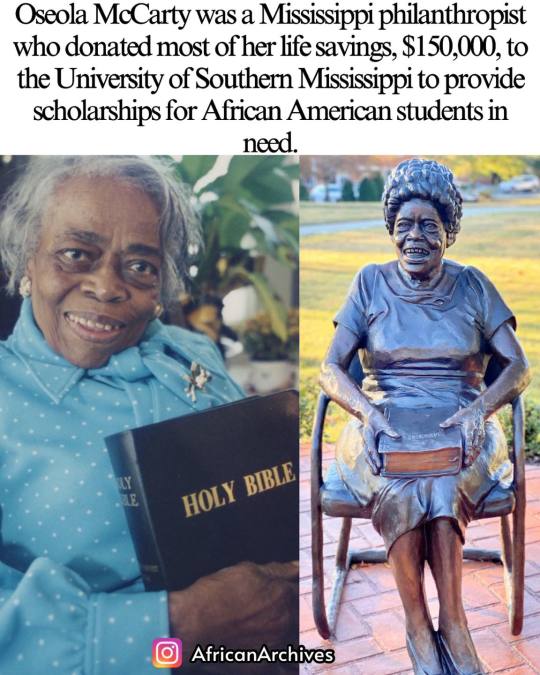
McCarty was born on March 7, 1908, in Shubuta, Mississippi. She was raised in nearby Hattiesburg by her aunt and grandmother. McCarty, who never married and had no children, lived frugally in a house without air conditioning. She never had a car or learned to drive, so she walked everywhere, including the grocery store that was one mile from her home.
When she was 8 years old, McCarty opened a savings account at a bank in Hattiesburg and began depositing the coins she earned from her laundry work. She would eventually open accounts in several local banks. By the time McCarty retired at age 86, her hands crippled by arthritis, she had saved $280,000. She set aside a pension for herself to live on, a donation to her church, and small inheritances for three of her relatives. The remainder—$150,000—she donated to the University of Southern Mississippi, a school that had remained all-white until the 1960s. McCarty stipulated that her gift be used for scholarships for Black students from southern Mississippi who otherwise would not be able to enroll in college due to financial hardship. Business leaders in Hattiesburg matched her bequest and hundreds of additional donations poured in from around the country, bringing the total endowment to nearly half a million dollars.
The first beneficiary of McCarty’s largesse was Stephanie Bullock, an 18-year-old honors student from Hattiesburg, who received a $1,000 scholarship. Bullock subsequently visited McCarty regularly and drove her around town on errands.
In 1998 the University awarded McCarty an honorary degree. She received an honorary doctorate from Harvard University, and President Bill Clinton awarded her the Presidential Citizens Medal.
McCarty died of liver cancer on September 26, 1999, at the age of 91. In 2019 McCarty’s home was moved to Hattiesburg’s Sixth Street Museum District and turned into a museum.
x
#oseola mccarty#philanthropist#university of southern mississippi#scholarship#black students#financial hardship#hattiesburg#mississippi#honorary degree#harvard university#presidential citizens medal#sixth street museum district#women's history month#history#black history
337 notes
·
View notes
Text
I got a full ride scholarship to my dream college and all my mom said was, "I think the red will wash out your complexion".
405 notes
·
View notes
Text
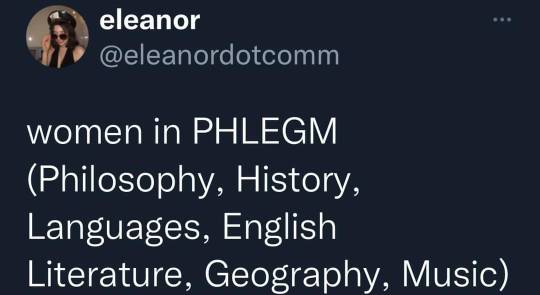
#light academia#quotes#classic academia#women in stem#literature#history#soft academia#dark academia#chaotic academia#light academism#humanities#english#english major#social science#music#women in music#women in history#Women in phlegm#scholarship#scholarly academia#phd scholar#dark academism#light acamedia#dark acamedia#english lit student#academia aesthetic#literary quotes#classic literature#reading
803 notes
·
View notes
Text
I am pleased to announce the Bad Science Jokes grant presented by Orion Technical College! We are helping people go back to school locally in Davenport, IA, and AROUND THE U.S., with their online classes.
🚨 $100,000 in total tuition assistance for 100 eligible students ! 🚨
💻The current online offerings are:
Medical Billing and Coding
Medical Assisting
Health Information Management
🏫Current on-location offerings in Davenport, Iowa:
EET (Electronics Engineering Technology)
Mechatronics
Massage Therapy
Medical Massage Therapy
🖱️Learn more by clicking here (or go to Orion.edu/BSJgrant ). It will take you to a #BadScienceJokes landing page. Fill out the form and someone from Orion Technical College will contact you soon to answer any questions you may have! All information you submit will only be seen by Orion Technical College staff.
Please share and let your friends know about the new Bad Science Jokes grant from Orion Technical College!
⏰Next start date is April 8th!
#back to school#college#orion technical college#orion tech#orion tech college#grant#scholarship#davenport iowa#davenport#quad cities#visit quad cities#bettendorf#iowa#moline#rock island#illinois#grant money#electronics#degree#massage therapy#medical coding#medical assisting#bad science jokes
62 notes
·
View notes
Text

All right, everyone: it's up for pre-order!
Strange Novel Worlds: Essays on Star Trek Tie-In Fiction, edited by Caroline-Isabelle Caron and me! Let's boldly go!
With chapters by Una McCormack and David Mack, alongside our academics!
You can pre-order from McFarland (publisher) here! (I know it's a bit expensive - academic book pricing, sorry, we didn't get a say in it!)
Engage!
58 notes
·
View notes
Text
This is so cool to see, if you know anyone aspiring to be a voice actor or is one in your life who deserves this scholarship, nominate them today~
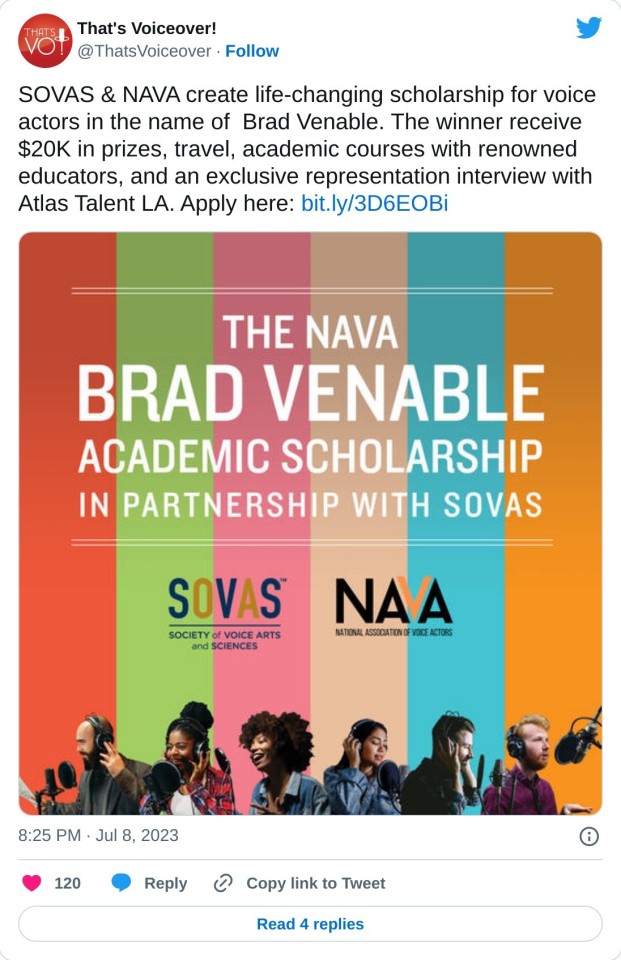
172 notes
·
View notes
Text
My new edited book: “Analyzing ‘Adventure Time‘”!
Hey, did you know that I edited a scholarly book about Adventure Time? Yup, that’s right, it’s called Analyzing Adventure Time, and it features over a dozen scholarly essays about the one cartoon about that kid and the dog. The book will be coming out this summer from McFarland & Co! Here’s the cover:
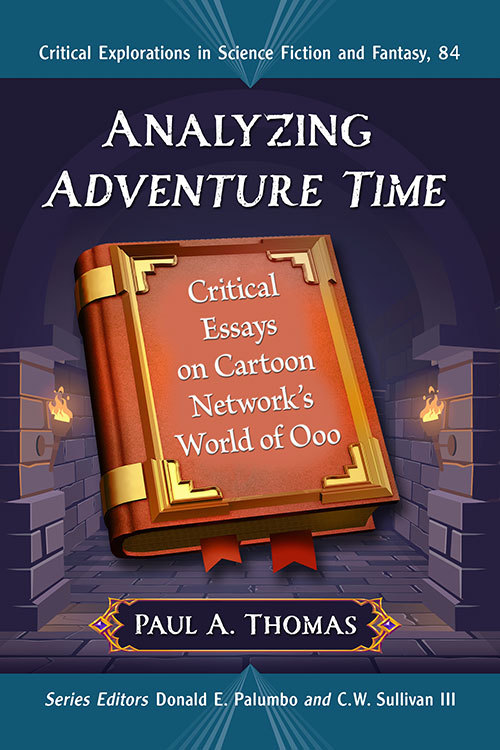
I’m pretty psyched about the project in general, but it’s doubly-cool that this book will be a part of McFarland’s “Critical Explorations in Science Fiction and Fantasy” series! Either way, if you’re interested, you can pre-order a copy here.
And here’s the table of contents + contributors for those who are interested:
Introduction (Paul A. Thomas)
Prelude: "The Three Levels of Adventure Time" (Paul A. Thomas)
"Be More Than the Binary: Experiencing Queer Subjectivity with BMO" (Olivia M. Vogt)
"From Censorship to 'Obsidian': A Critical and Historical Look at 'Bubbline'" (Mage Hadley)
"Rainbows and Unicorns: The Influence of Bubbline on Apocalyptic Film and Animation" (Steven Holmes)
"'Get your hero on, dude!' Charting Jake’s Growth as a Positive Masculine Role Model" (Bridget M. Blodgett and Anastasia Salter)
"Yellow Voices and Rainbow Bodies: Accent, Multilingualism, and the Politics of Representation in Adventure Time" (Camille Chane)
"Mikhail Bakhtin in the Land of Ooo: The Carnivalesque, Heteroglossia, and the Fun That Never Ends" (Aaron Kerner and Birdy Wei-Ting Hung)
"'And we will happen again and again': Adventure Time and the Sisyphean Struggle" (Sequoia Stone)
"What Time Is It? Postmodernity! Postmodern Praxis in Adventure Time" (Jenine Oosthuizen)
"Making a New Meaning for Man in The Land of OOO: Object-Oriented Ontology, the NonHuman, and Difference in Distant Lands" (Al Valentín)
"Too Close for Comfort: On Finn the Human and Princess Bubblegum’s Relationship" (Zhi Hwee Goh)
"Of Lacan and Lemons: A Psychoanalytic Reading of Season Six’s 'The Mountain'" (Paul A. Thomas)
"Trauma and the Body in Adventure Time" (Steven Kielich)
"The Japanese Spirit and Aesthetic in Western Animation: The Influence of Anime on Adventure Time" (Kendra N. Sheehan
"'Bad Jubies': Giving Value to the Intangible in Artistic Professions" (Catalina Millán Scheiding)
Note that this is different work from Exploring the Land of Ooo... that work is going to be reissued this year by the University Press of Mississippi, though, so stay tuned for news about that as well!
#adventure time#atimers#finn the human#jake the dog#princess bubblegum#marceline the vampire que#marceline#bubbline#lemongrab#lacan#scholarship#pop culture#mcfarland and company#mcfarland
301 notes
·
View notes
Text
لكني كنت أخاف من السرعة التي تحدث بها الأشياء، كنت أخاف أن تصبح مشاعري تجاهك عادية، أن أستيقظ بقلب لا يحمل لك شيئًا أو يحمل لك فقط أنك كنت تحتله يومًا ما بأكمله، كنت أخاف أن يشبه وجهك كل الوجوه التي أراها كل يوم؛ ولا يأتي صوتك بالغيم والمطر في صدري.. خفت أن أجهلك.
#تميز#تلفزيون#تلاوة#تمبلريات#تمبلر#تمبلر بالعربي#عرب تمبلر#اقتباسات تمبلر#ثقل#ثقافة#جبر الخواطر#جبران خليل جبران#خواطر#خواطري#حياة#حب#حزن#حديث#mental heath support#health#mentalwellness#الانسانية#tumblr milestone#motivational quotes#الخيانة#scholarship#الحب#الموت
35 notes
·
View notes
Text
The majority of censorship is self-censorship

I'm on tour with my new novel The Bezzle! Catch me TONIGHT in SAN DIEGO (Feb 22, Mysterious Galaxy). After that, it's LA (Saturday night, with Adam Conover), Seattle (Monday, with Neal Stephenson), then Portland, Phoenix and more!

I know a lot of polymaths, but Ada Palmer takes the cake: brilliant science fiction writer, brilliant historian, brilliant librettist, brilliant singer, and then some:
https://pluralistic.net/2022/02/10/monopoly-begets-monopoly/#terra-ignota
Palmer is a friend and a colleague. In 2018, she, Adrian Johns and I collaborated on "Censorship, Information Control, & Information Revolutions from Printing Press to Internet," a series of grad seminars at the U Chicago History department (where Ada is a tenured prof, specializing in the Inquisition and Renaissance forbidden knowledge):
https://ifk.uchicago.edu/research/faculty-fellow-projects/censorship-information-control-information-revolutions-from-printing-press/
The project had its origins in a party game that Ada and I used to play at SF conventions: Ada would describe a way that the Inquisitions' censors attacked the printing press, and I'd find an extremely parallel maneuver from governments, the entertainment industry or other entities from the much more recent history of internet censorship battles.
With the seminars, we took it to the next level. Each 3h long session featured a roster of speakers from many disciplines, explaining everything from how encryption works to how white nationalists who were radicalized in Vietnam formed an armored-car robbery gang to finance modems and Apple ][+s to link up neo-Nazis across the USA.
We borrowed the structure of these sessions from science fiction conventions, home to a very specific kind of panel that doesn't always work, but when it does, it's fantastic. It was a natural choice: after all, Ada and I know each other through science fiction.
Even if you're not an sf person, you've probably heard of the Hugo Awards, the most prestigious awards in the field, voted on each year by attendees of the annual World Science Fiction Convention (Worldcon). And even if you're not an sf fan, you might have heard about a scandal involving the Hugo Awards, which were held last year in China, a first:
https://www.nbcnews.com/news/world/science-fiction-authors-excluded-hugo-awards-china-rcna139134
A little background: each year's Worldcon is run by a committee of volunteers. These volunteers put together bids to host the Worldcon, and canvass Worldcon attendees to vote in favor of their bid. For many years, a group of Chinese fans attempted to field a successful bid to host a Worldcon, and, eventually, they won.
At the time, there were many concerns: about traveling to a country with a poor human rights record and a reputation for censorship, and about the logistics of customary Worldcon attendees getting visas. During this debate, many international fans pointed to the poor human rights record in the USA (which has hosted the vast majority of Worldcons since their inception), and the absolute ghastly rigmarole the US government subjects many foreign visitors to when they seek visas to come to the US for conventions.
Whatever side of this debate you came down on, it couldn't be denied that the Chinese Worldcon rang a lot of alarm-bells. Communications were spotty, and then the con was unceremoniously rescheduled for months after the original scheduled date, without any good explanation. Rumors swirled of Chinese petty officials muscling their way into the con's administration.
But the real alarm bells started clanging after the Hugo Award ceremony. Normally, after the Hugos are given out, attendees are given paper handouts tallying the nominations and votes, and those numbers are also simultaneously published online. Technically, the Hugo committee has a grace period of some weeks before this data must be published, but at every Worldcon I've attended over the past 30+ years, I left the Hugos with a data-sheet in my hand.
Then, in early December, at the very last moment, the Hugo committee released its data – and all hell broke loose. Numerous, acclaimed works had been unilaterally "disqualified" from the ballot. Many of these were written by writers from the Chinese diaspora, but some works – like an episode of Neil Gaiman's Sandman – were seemingly unconnected to any national considerations.
Readers and writers erupted in outrage, demanding to know what had happened. The Hugo administrators – Americans and Canadians who'd volunteered in those roles for many years and were widely viewed as being members in good standing of the community – were either silent or responded with rude and insulting remarks. One thing they didn't do was explain themselves.
The absence of facts left a void that rumors and speculation rushed in to fill. Stories of Chinese official censorship swirled online, and along with them, a kind of I-told-you-so: China should never have been home to a Worldcon, the country's authoritarian national politics are fundamentally incompatible with a literary festival.
As the outrage mounted and the scandal breached from the confines of science fiction fans and writers to the wider world, more details kept emerging. A damning set of internal leaks revealed that it was those long-serving American and Canadian volunteers who decided to censor the ballot. They did so out of a vague sense that the Chinese state would visit some unspecified sanction on the con if politically unpalatable works appeared on the Hugo ballot. Incredibly, they even compiled clumsy dossiers on nominees, disqualifying one nominee out of a mistaken belief that he had once visited Tibet (it was actually Nepal).
There's no evidence that the Chinese state asked these people to do this. Likewise, it wasn't pressure from the Chinese state that caused them to throw out hundreds of ballots cast by Chinese fans, whom they believed were voting for a "slate" of works (it's not clear if this is the case, but slate voting is permitted under Hugo rules).
All this has raised many questions about the future of the Hugo Awards, and the status of the awards that were given in China. There's widespread concern that Chinese fans involved with the con may face state retaliation due to the negative press that these shenanigans stirred up.
But there's also a lot of questions about censorship, and the nature of both state and private censorship, and the relationship between the two. These are questions that Ada is extremely well-poised to answer; indeed, they're the subject of her book-in-progress, entitled Why We Censor: from the Inquisition to the Internet.
In a magisterial essay for Reactor, Palmer stakes out her central thesis: "The majority of censorship is self-censorship, but the majority of self-censorship is intentionally cultivated by an outside power":
https://reactormag.com/tools-for-thinking-about-censorship/
States – even very powerful states – that wish to censor lack the resources to accomplish totalizing censorship of the sort depicted in Nineteen Eighty-Four. They can't go from house to house, searching every nook and cranny for copies of forbidden literature. The only way to kill an idea is to stop people from expressing it in the first place. Convincing people to censor themselves is, "dollar for dollar and man-hour for man-hour, much cheaper and more impactful than anything else a censorious regime can do."
Ada invokes examples modern and ancient, including from her own area of specialty, the Inquisition and its treatment of Gailileo. The Inquistions didn't set out to silence Galileo. If that had been its objective, it could have just assassinated him. This was cheap, easy and reliable! Instead, the Inquisition persecuted Galileo, in a very high-profile manner, making him and his ideas far more famous.
But this isn't some early example of Inquisitorial Streisand Effect. The point of persecuting Galileo was to convince Descartes to self-censor, which he did. He took his manuscript back from the publisher and cut the sections the Inquisition was likely to find offensive. It wasn't just Descartes: "thousands of other major thinkers of the time wrote differently, spoke differently, chose different projects, and passed different ideas on to the next century because they self-censored after the Galileo trial."
This is direct self-censorship, where people are frightened into silencing themselves. But there's another form of censorship, which Ada calls "middlemen censorship." That's when someone other than the government censors a work because they fear what the government would do if they didn't. Think of Scholastic's cowardly decision to pull inclusive, LGBTQ books out of its book fair selections even though no one had ordered them to do so:
https://www.nytimes.com/2023/05/06/books/scholastic-book-racism-maggie-tokuda-hall.html
This is a form of censorship outsourcing, and it "multiplies the manpower of a censorship system by the number of individuals within its power." The censoring body doesn't need to hire people to search everyone's houses for offensive books – it can frighten editors, publishers, distributors, booksellers and librarians into suppressing the books in the first place.
This outsourcing blurs the line between state and private surveillance. Think about comics. After a series of high-profile Congressional hearings about the supposed danger of comics to impressionable young minds, the comics industry undertook a regime of self-censorship, through which the private Comics Code Authority would vet comings for "dangerous" content before allowing its seal of approval to appear on the comics' covers. Distributors and retailers refused to carry books without a CCA stamp, so publishers refused to publish books unless they could get a CCA stamp.
The CCA was unaccountable, capricious – and racist. By the 60s and 70s, it became clear that comic about Black characters were subjected to much tighter scrutiny than comics featuring white heroes. The CCA would reject "a drop of sweat on the forehead of a Black astronaut as 'too graphic' since it 'could be mistaken for blood.'" Every comic that got sent back by the CCA meant long, brutal reworkings by writers and illustrators to get them past the censors.
The US government never censored heroes like Black Panther, but the chain of events that created the CCA "middleman censors" made sure that Black Panther appeared in far fewer comics starring Marvel's most prominent Black character. An analysis of censorship that tries to draw a line between private and public censorship would say that the government played no role in Black Panther's banishment to obscurity – but without Congressional action, Black Panther would never have faced censorship.
This is why attempts to cleanly divide public and private censorship always break down. Many people will tell you that when Twitter or Facebook blocks content they disagree with, that's not censorship, since censorship is government action, and these are private actors. What they mean is that Twitter and Facebook censorship doesn't violate the First Amendment, but it's perfectly possible to infringe on free speech without violating the US Constitution. What's more, if the government fails to prevent monopolization of our speech forums – like social media – and also declines to offer its own public speech forums that are bound to respect the First Amendment, we can end up with government choices that produce an environment in which some ideas are suppressed wherever they might find an audience – all without violating the Constitution:
https://locusmag.com/2020/01/cory-doctorow-inaction-is-a-form-of-action/
The great censorious regimes of the past – the USSR, the Inquisition – left behind vast troves of bureaucratic records, and these records are full of complaints about the censors' lack of resources. They didn't have the manpower, the office space, the money or the power to erase the ideas they were ordered to suppress. As Ada notes, "In the period that Spain’s Inquisition was wildly out of Rome’s control, the Roman Inquisition even printed manuals to guide its Inquisitors on how to bluff their way through pretending they were on top of what Spain was doing!"
Censors have always done – and still do – their work not by wielding power, but by projecting it. Even the most powerful state actors are not powerful enough to truly censor, in the sense of confiscating every work expressing an idea and punishing everyone who creates such a work. Instead, when they rely on self-censorship, both by individuals and by intermediaries. When censors act to block one work and not another, or when they punish one transgressor while another is free to speak, it's tempting to think that they are following some arcane ruleset that defines when enforcement is strict and when it's weak. But the truth is, they censor erratically because they are too weak to censor comprehensively.
Spectacular acts of censorship and punishment are a performance, "to change the way people act and think." Censors "seek out actions that can cause the maximum number of people to notice and feel their presence, with a minimum of expense and manpower."
The censor can only succeed by convincing us to do their work for them. That's why drawing a line between state censorship and private censorship is such a misleading exercise. Censorship is, and always has been, a public-private partnership.

If you'd like an essay-formatted version of this post to read or share, here's a link to it on pluralistic.net, my surveillance-free, ad-free, tracker-free blog:
https://pluralistic.net/2024/02/22/self-censorship/#hugos
#pluralistic#ada palmer#worldcon#hugos#china#science fiction#fanac#publishing#censorship#systems of information control during information revolutions#scholarship
2K notes
·
View notes
Text
I Am Transsexual and Want An Education
Most of you know I am a transsexual. I do not hide it and I have never tried to.
I am also a college student. Like many Americans, I cannot really afford to be there. Many trans people like me cannot afford higher education either.
Transgender people don’t have the same kind of opportunities that cisgender people do. Either you live a lie and torture yourself because you know your family will forsake you if you say anything, you tell them everything and are kicked out, or you are lucky enough to get a neutral to positive response. Yes, neutral is lucky.
The trans folks that say nothing and live in agony being unsupported and trapped can maybe go to college but know that if they say anything their tuition might be out the door, that their parents or family or guardians will throw them to the wolves. So they either suffer in silence or end up committing suicide.
The trans folks that came out and were kicked out have basically no chance at ever going to college. You might be able to get government and private loans, but you’ll be drowning in debt by the end of it all. Debt you may never be able to pay off alone.
The remaining lucky ones most likely still come from low to middle income families that can’t really afford college anyways. It is a borderline no-win scenario.
How is this fair? Can’t everybody see this is cruel? This is a struggle faced by all queer people, but is intensified by the trans label. We are easy targets.
I was once talking to a girl who was also queer, but not trans. I said, “Rae, in my state, it is illegal for me to use a public restroom. It is illegal for public institutions to give me my life saving medication. I have almost no rights. We are witnessing a modern-day segregation.” I live in Florida.
She turned to me and said, “You know it’s hard for me too. There are like, no gay bars in my city. No fun ones anyway.”
I felt like I had been slapped. I never really talked to her again.
Of course, all queer people face oppression, but for her to dismiss the violent and dangerous actions that are being taken against my people in favor of her own problems highlights a deeper issue with the attitude towards trans people.
We are an afterthought.
We are different.
Other people are so far removed from the plight of trans people that they do not recognize how privileged they are by comparison and damn it I refuse to be an afterthought for much longer.
I do not want to live in quiet, secret moments anymore. I do not want to be in the shadows and behind closed doors. I want to feel comfortable out in the open. I shouldn’t have to hide. Let me wear what I want and be what I am. Let me hold my boyfriend’s hand in public. Let me be able to take off my binder or just not wear it at all. Let my people have healthcare and basic human decency. Let us get an education and let us use the goddamn bathroom. Let us. Let us. Let us.
81 notes
·
View notes
Text
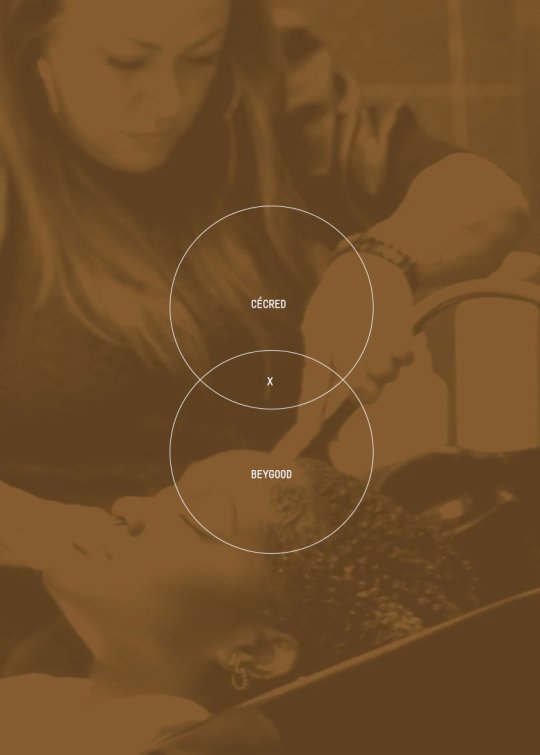

Beyoncé announces BEYGOOD x CÉCRED Fund.
An annual $500,000 will fund cosmetology school scholarships and salon business grants across five cities chosen for their large, diverse community of hair stylists: Atlanta, Chicago, Houston, Los Angeles, and New Jersey.
—Apply now:
20 notes
·
View notes
Text
question for the Dracula scholarship side of tumblr:
Is there a record of the American serialization of "Dracula" by Bram Stoker in newspapers? Specifically, do we know how the 1897 American newspapers broke up "Dracula" into installments and how often they were published (daily or weekly, etc.)?
While I love me some Dracula Daily... I'm curious if the 1897 serialized newspaper version was also in fact daily, which chapters were when, etc.
24 notes
·
View notes
Text
Over and over I am reminded that institutionalized academia is a pillar of white supremacy. Expertise built on the exclusion of the colonized and disabled for the purpose of propagating colonial, eugenicist structures and rationalizations. Decolonial academia has become just an excuse to study us like bugs under a microscope and speak over us, rather than treat us as experts of our own reality and oppressions.
#academia#i think white people should shut the fuck up forever at this point#seriously we have heard the iterations of racism and ableism already. you really have nothing whatsoever to add to the conversation#white supremacy#gatekeeping#global south#racism#anti blackness#ableism#formal education#colonialism#colonization#western imperialism#imperial core#decolonization#decolonial studies#post-colonial studies#scholarship#white privilege#white people#white academia#knee of huss
15 notes
·
View notes
